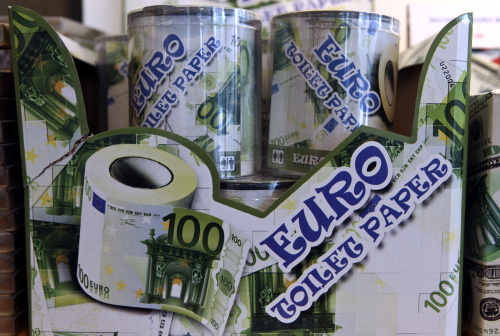FRANKFURT (AFP) ― Banks’ deposits with the European Central Bank have hit yet another new record, data showed Monday, just days after the ECB pumped more than half a trillion euros into banks to unclog seized credit markets.
Banks put 820.8 billion euros ($1.08 trillion) on deposit for 24 hours at the ECB overnight Friday, beating the previous record set the day before of 776.9 billion euros.
Rising levels of deposits at the central bank are seen by some as a possible sign of market tensions since the money deposited earns interest of 0.25 percent, much less than the rate available on the interbank market.
Thus, heavy use of the facility suggests banks favor parking the money at low interest with the ECB rather than lending it to each other.
 |
Tins of toilet tissue, printed in the style of a 100 euro note, sit for sale in a souvenir store in Frankfurt. (Bloomberg) |
But the massive amount currently held on deposit is not seen by analysts as surprising in the wake of last week’s long-term refinancing operation (or LTRO) in which the ECB pumped a record 529.5 billion euros into euro area banks to avert a credit crunch.
Separately, ECB data showed that the central bank bought no bonds of eurozone nations last week for the third week in a row.
The ECB first launched its bond-buying blitz, or Securities Market Program, in 2010 to help debt-wracked eurozone countries that were finding it difficult to drum up financing in the normal way via the markets.
The program was controversial from the start, with critics saying the ECB was overstepping its mandate in buying up sovereign bonds on the secondary market.
ECB President Mario Draghi and his predecessor Jean-Claude Trichet always said the measure was only temporary and aimed at easing strains in the 17-nation euro bloc but two prominent German ECB members quit in protest over the practice.
Between January and August 2011, the purchases dried up, but the ECB resumed the program in August when renewed strains pushed Italian and Spanish borrowing rates to unsustainable levels.
At one point, purchases reached as much as 22 billion euros ($29 billion) in a single week.
In total, the ECB has now bought a total 219.5 billion euros in eurozone government bonds since the start of the prograe.








